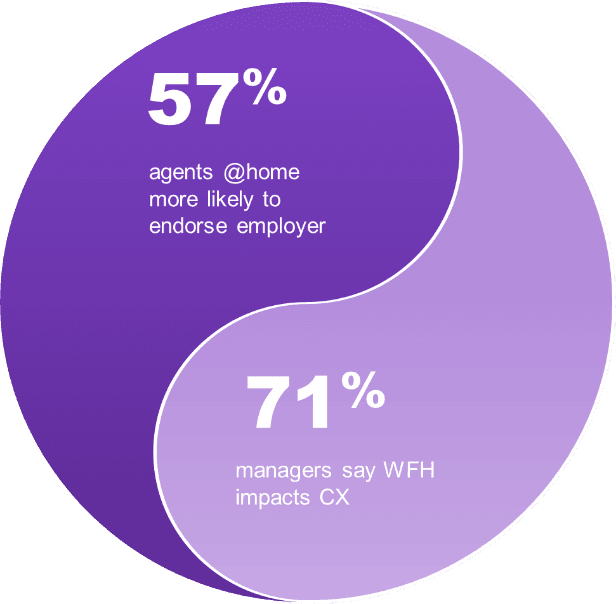
- Try to keep your in-office routine at home. Continue to hold regular daily stand-up and weekly team meetings, using collaboration tools to provide a remote alternative to in-person interactions.
- Show agents that you’re still available. Working from home, you can’t just peek your head out your office door or stop by desks to talk to your team. So, make sure you are proactively engaging with our agents to see how they are coping and quickly respond to their requests for assistance or support.
- Continue holding agents to your in-office quality standards. Even though everyone is remote, you should still be using the same quality forms and scoring methods that you used in the physical office. Schedule regular debrief and coaching sessions so your team is getting timely feedback and quickly resolve any issues or concerns.
Continue Communicating
- Keep scheduling weekly 1:1s for direct communication and stick to them. It goes without saying, but communication is always important to team productivity, and even more so when managing remote agents.
- Block “open office” time every day where you’ll be available on a conference bridge for impromptu discussions. Agents can hop on and get their questions answered or address concerns, like a virtual open-door policy.
- Keep agents in the loop. It’s also important to make sure your agents are kept up to date on the latest plans related to COVID and your return to the office policy – even if the update is just that the plan isn’t changing. This approach helps alleviates and gets ahead any unfounded rumors.
Be Flexible
- Show that you can go with the flow. This pandemic has made all of us accept that life today is very unpredictable. Lead by example and show your agents that you’re open to new ways of working, solving problems and supporting both them and your customers.
- Talk to each of your agents to understand their unique situations. Some may have kids at home or have spouses that work opposite hours. Once you know their specific situation you might be able to offer accommodations to help.
- Adjust schedules. Something as simple as a longer lunch period could be the difference between sanity and chaos in your agent’s house. Workforce management techniques like block scheduling, split shifts, or optional voluntary time off can help your agents balance their personal and professional responsibilities.

- Let technology bridge the gap. Many agents get performance insights by quickly glancing at wallboards in the contact center, or by hearing the latest information from their supervisor as they walk by or from a colleague at the coffee machine. In the absence of these in-office touch points, you need to find ways to make sure agents are still getting those insights. Use technology to make the delivery of these insights and feedback as efficient as possible. As an example,
NiCE CXone Quality Management sends automatic notifications to your agents desktop to let them know that a new quality management evaluation or coaching package has been routed to them. When the work is automated, there’s no delay in keeping agents updated.
- Empower your agents with performance data. Use the real-time dashboards and agent scorecards that are available on the agent desktop to replace the gap left by not having wallboards. These insights are great because they act as a barometer on how individual agents and the team are performing. The ability to see this in real time from home is huge, rather than waiting daily for a performance email form a supervisor, in which case it’s too late to course correct.
Have Fun!
- Bring on the games: In most organizations, the contact center is always the fun team. They’re the first to host potlucks and celebrations and fill the room with energy. It’s a big cultural change as agents move from an active social environment to working alone in their home office. But, with some effort the change doesn’t have to be drastic. Hold a dance, fitness or bake challenge or a theme day and share the pictures to vote on the winner.
- Schedule ongoing virtual coffee breaks and happy hours. These informal get-togethers are also a good idea because you can mandate them as them work-free zones, where you get together and chat.
- Incorporate more gamification than before. Incentivize certain performance metrics– just make sure the metrics make sense for your business and you keep it fair providing enough equal opportunities to win.
- Assign remote work buddies. Outside of planned coffee breaks and happy hours, have someone check in on your agents and ask how things are going. This type of informal outreach can go a long way in making sure agents feel supported.




